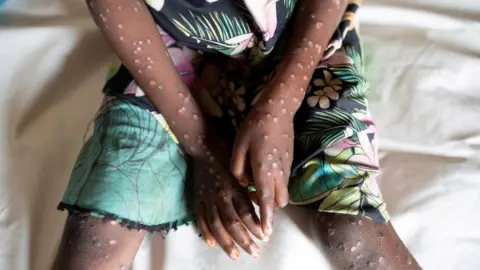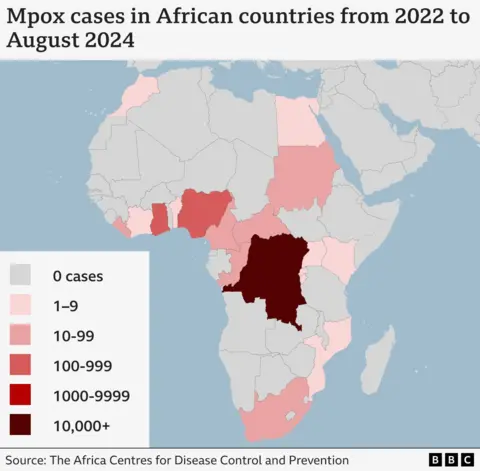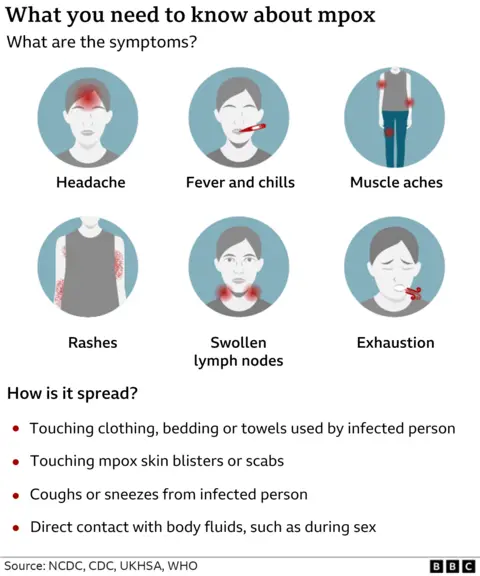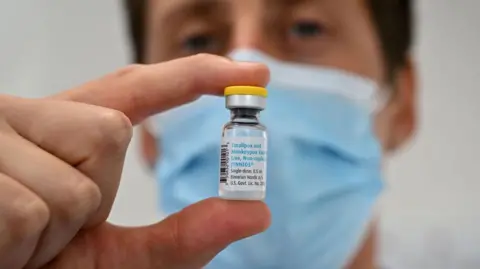ARTICLE AD BOX

 Reuters
Reuters
Outbreaks in DR Congo have affected children as well as adults
Africa's top health body says an mpox outbreak in central and eastern Africa is a continent-wide public health emergency.
The Africa Centres for Disease Control and Prevention (CDC) says it is more worrying than previous outbreaks because it involves a dangerous new variant of the disease.
How common is mpox and in which countries does it occur?


Mpox disease is caused by the monkeypox virus. This is from the same group of viruses as smallpox but is much less harmful.
The virus was originally transmitted from animals to humans but now also passes between humans.
It is most common in remote villages in the tropical rainforests of Africa, in countries such as the Democratic Republic of Congo (DR Congo).
In these regions, there are thousands of cases and hundreds of deaths from the disease every year - with children under 15 worst affected.
Two main strains of the virus have been circulating.
“Clade I” is endemic in central Africa. “Clade Ib” is the new, more virulent type of the virus involved in the current outbreak.
Africa CDC says there were more than14,500 mpox infections and over 450 deaths from mpox between the start of 2024 and the end of July. That is a 160% increase in infections and a 19% increase in deaths compared with the same period in 2023.
While 96% of mpox cases are in DR Congo, the disease has spread to many neighbouring countries such as Burundi, Kenya, Rwanda and Uganda, where it is not normally endemic.
A milder strain of mpox called “Clade II”, which exists in West Africa, caused a global outbreak in 2022.
It spread to nearly 100 countries which do not normally see the virus, including some in Europe and Asia, but was brought under control by vaccinating vulnerable groups.
There is poor access to mpox vaccines and treatments in DR Congo and health officials are concerned about the spread of the disease.
Experts say the new strain may be spreading more easily, causing more serious disease and more deaths in children and adults.
What are the symptoms of mpox?
Initial symptoms include fever, headaches, swellings, back pain and aching muscles.
Once the fever breaks, a rash can develop, often beginning on the face then spreading to other parts of the body, most commonly the palms of the hands and soles of the feet.
The rash, which can be extremely itchy or painful, changes and goes through different stages before finally forming a scab, which later falls off. The lesions can cause scarring.
The infection usually clears up on its own and lasts between 14 and 21 days.
Serious cases can see lesions attack the whole of the body, and especially the mouth, eyes and genitals.


How is it spread?
Mpox spreads from person to person through close contact with someone who is infected - including through sex, skin-to-skin contact and talking or breathing close to another person.
The virus can enter the body through broken skin, the respiratory tract or through the eyes, nose or mouth.
It can also be spread through touching objects which have been contaminated by the virus, such as bedding, clothing and towels.
Close contact with infected animals, such as monkeys, rats and squirrels, is another route.
During the global outbreak in 2022, the virus spread mostly through sexual contact.
The current outbreak from DR Congo is being driven by sexual contact, but has also been found in other communities.
Who is most at risk?

 Getty Images
Getty Images
There are vaccines which protect against severe mpox
Most cases are often found in people who are sexually active and men who have sex with men. People with several partners or new sexual partners can be most at risk.
But anyone who has close contact with someone with symptoms can catch the virus, including health workers and family members.
Advice is to avoid close contact with anyone with mpox and clean your hands with soap and water if the virus is in your community.
Those who have mpox should isolate from others until all their lesions have disappeared.
Condoms should be used as a precaution when having sex for 12 weeks after recovery, the World Health Organization (WHO) says.
How can it be treated?
Outbreaks of mpox can be controlled by preventing infections - the best way of doing that is with vaccines.
Vaccines exist but only people at risk or who have been in close contact with an infected person are usually able to have it.
The WHO has recently asked drug manufacturers to put forward their mpox vaccines for emergency use, even if those vaccines have not been formally approved in the countries where they are needed.
Now that the Africa CDC has declared a continent-wide public health emergency, it is hoped that governments will be better able to co-ordinate their response and potentially increase the flow of medical supplies and aid into affected areas.

 9 months ago
56
9 months ago
56








 English (US) ·
English (US) ·